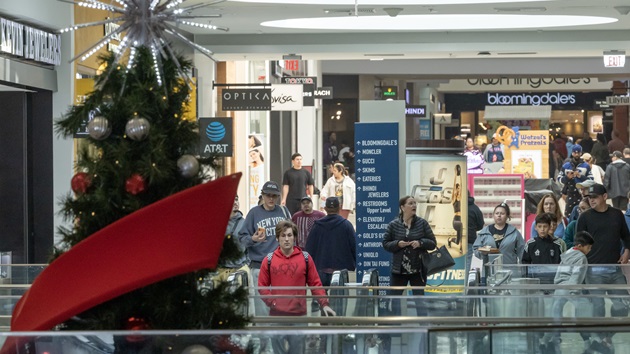Mercedes-Benz workers in Alabama are voting to join the UAW. Here’s what’s at stake for workers nationwide.
Written by ABC Audio All Rights Reserved on May 15, 2024

(NEW YORK) — Thousands of Mercedes-Benz workers in Alabama are voting on a union this week, marking a major test for the United Auto Workers just one month after a watershed victory in nearby Tennessee.
The UAW faces a more difficult contest this time around because Mercedes-Benz has carried out an anti-union campaign, attempting to dissuade workers and tilt the outcome, experts told ABC News.
A victory would hold significant implications, redoubling the union’s momentum as it seeks to organize a slew of additional plants throughout the South, where auto workers have struggled to gain a foothold for decades, they said.
A loss, however, could scare off workers at other facilities and derail the union’s success.
Here’s what’s at stake for auto workers and the wider labor movement:
Can the UAW sustain its momentum and unionize more carmakers?
The union vote this week involving roughly 5,000 Mercedes-Benz workers near Tuscaloosa, Alabama, is the latest sign of momentum for the UAW since union members went on strike against the Big 3 U.S. automakers last fall.
The high-profile standoff contributed to billions of dollars in losses for the companies and put thousands of workers temporarily out of work. But the gamble paid off, helping the union achieve historic wage gains and other long-sought reforms.
The breakthrough triggered a wave of UAW organizing, the union says. Over 10,000 non-union autoworkers have signed cards in support of the UAW in recent months and organizing campaigns have broken out at more than two dozen facilities, the union said in a statement in March.
Last month, the workers at a Volkswagen facility in Chattanooga, Tennessee, voted to join the UAW by a landslide margin of 2,628 to 985. The victory marked the first car plant in the South to unionize with a vote since the 1940s.
“To see Tennessee make history as far as the South — it’s big,” Sammie Ellis, 35, an assembly worker for Mercedes-Benz at the plant in Alabama who supports the union, told ABC News. “It sends a clear message.”
A union, Ellis said, would deliver better health benefits and pay, as well as “all-around respect for employees.”
In addition to the plant in Alabama, the UAW is aiming to unionize 12 facilities across the South, Stephen Silvia, a professor at American University and the author of “The UAW’s Southern Gamble,” told ABC News.
“There’s a question of whether the UAW will be successful in keeping its momentum going,” Silvia said.
Can unions win in large workplaces when facing an anti-union campaign?
The union drive in Alabama poses several challenges when compared with the UAW recent victory in Chattanooga, most notably the presence of an anti-union campaign, experts said.
The circumstances touch on a question that has loomed over the labor movement in recent years: Can unions win at big workplaces, such as Amazon warehouses or auto plants, if they face opposition from an employer?
In April 2022, warehouse workers at a 6,000-worker Amazon facility formed the first-ever U.S. union at the company, though no additional warehouses have unionized since. On the other hand, Starbucks workers have succeeded in unionizing roughly 400 of the company’s stores, which range in number but typically involve about 30 employees.
In Chattanooga, Volkswagen took a posture of neutrality toward the union, forgoing input about whether workers should organize. By contrast, Mercedes-Benz has undertaken a coordinated effort to dissuade workers from supporting the effort, said Ellis.
Officials at the facility have put up flyers, worn hats and handed out towels that all bear the same message: “Vote no,” according to Ellis.
“They are heavy on voting no,” Ellis added.
In response to ABC News’ request for comment, Mercedes-Benz said in a statement that it supports workers’ right to determine whether they want union representation.
“Mercedes-Benz U.S. International (MBUSI) fully respects our Team Members’ choice whether to unionize and we look forward to participating in the election process to ensure every Team Member has a chance to cast their own secret-ballot vote, as well as having access to the information necessary to make an informed choice,” a company spokesperson said.
“We believe open and direct communication with our Team Members is the best path forward to ensure continued success,” the spokesperson added.
When asked about the implications for unions seeking to organize large workplaces amid employer opposition, Art Wheaton, director of labor studies at the Worker Institute at Cornell University said, “If they win, it does help move the needle.”
What message will the UAW send to the wider labor movement?
In recent years, the U.S. labor movement has grown in popularity and made headlines with high-profile strikes, but it has failed to increase the share of the workforce that belongs to a union.
Sixty-seven percent of Americans approve of unions, a Gallup poll last year showed, putting the favorability of unions near its highest level since 1965.
Still, union membership has shrunk. Only 10% of U.S. workers belonged to unions last year, little changed from the year prior, U.S. Bureau of Labor Statistics data showed. That figure marks a steep drop from a peak of nearly 25% in the 1950s.
A victory at the Alabama plant could show that the resurgent popularity and militancy of unions can translate into membership gains, Harry Katz, a professor of collective bargaining at Cornell University, told ABC News.
“Maybe it suggests [there’s] more momentum for organizing than we’ve seen in the past,” Katz said.
Ellis, the Mercedes-Benz worker in Alabama, said he hopes a victory will show workers that unions help deliver a path to a decent livelihood.
“Those people will be able to come into these manufacturers and acquire skills that will provide great pay, great benefits and allow them to take care of themselves and their families,” Ellis said.
Copyright © 2024, ABC Audio. All rights reserved.

 KVSP
KVSP 





